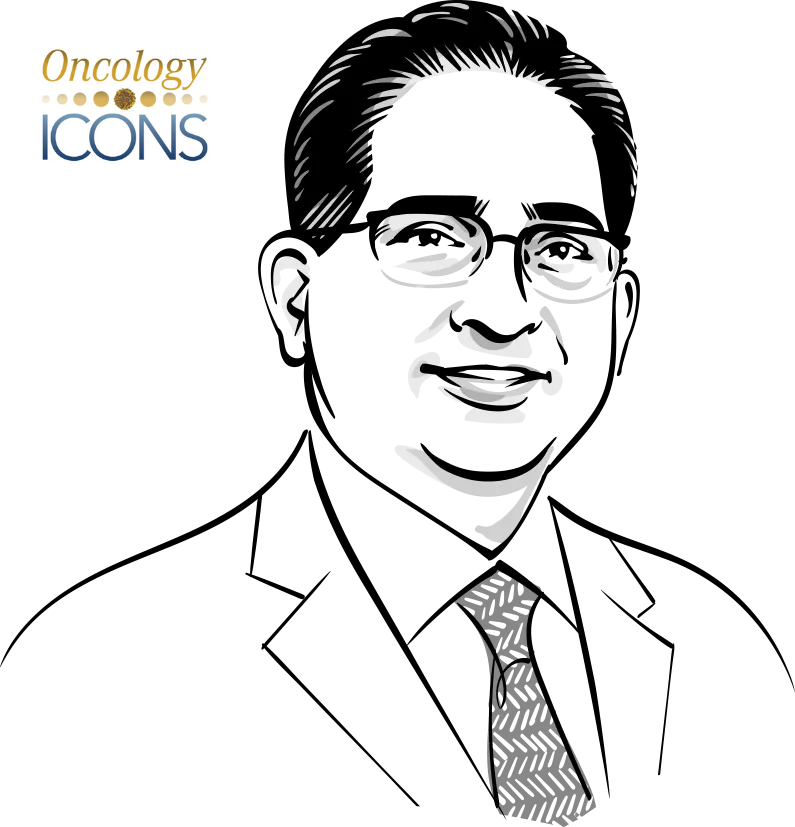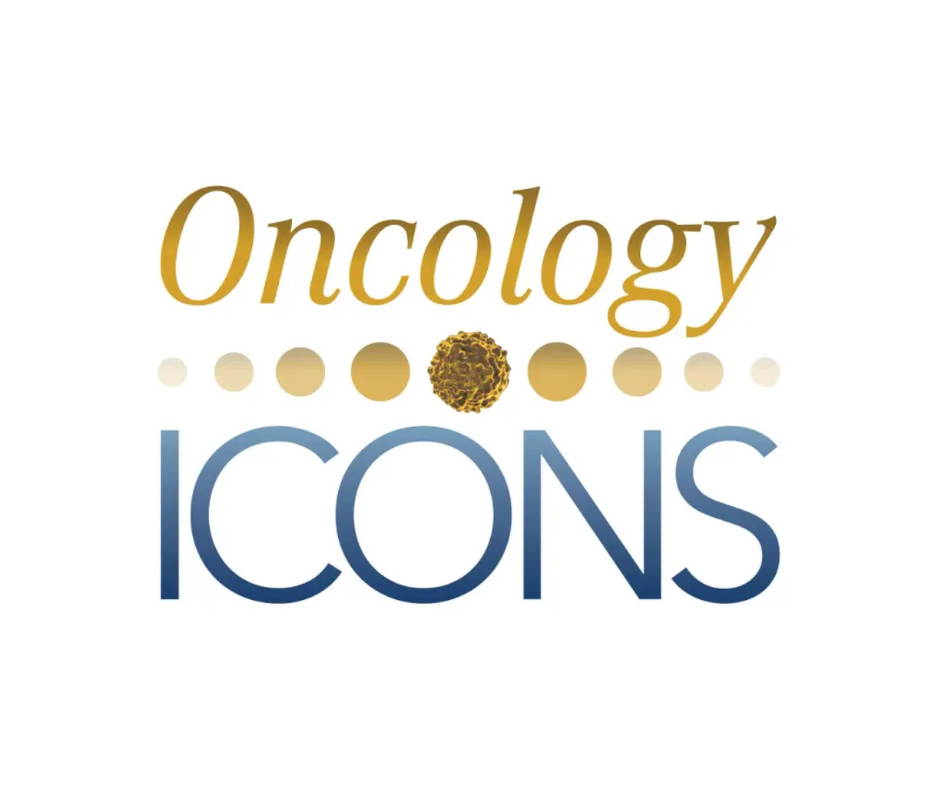Manmeet Ahluwalia: ‘I Wanted to Come to the United States and Cure Cancer’
In an interview with Targeted Oncology, Manmeet S. Ahluwalia, MD, a Q2 2023 Oncology Icons honoree, looks back on the career moves that led him to this award, including his work at Cleveland Clinic, the ASCO Leadership Development Program, and Baptist Health South Florida.
Manmeet S. Ahluwalia, MD

The journey to a celebrated career in oncology started at a young age for Manmeet S. Ahluwalia, MD. Cancer plagued a close relative and planted a seed of passion for finding a cure. Once Ahluwalia’s self-proclaimed naivety wore off, the same passion led him to help build a world-renowned clinical trial program for brain tumors at Cleveland Clinic’s Rose Ella Burkhardt Brain Tumor and Neuro-Oncology Center and later, another program at Baptist Health South Florida.
Ahluwalia is the chief scientific officer, chief of medical oncology, deputy director and Fernandez family endowed chair at Baptist Health Miami Cancer Institute, and chief scientific officer for Lynn Cancer Institute. Having joined in 2021, Ahluwalia has been instrumental in introducing targeted therapy and immunotherapy clinical trials for patients with brain cancer or secondary brain tumors in the Miami metropolitan area. His work includes countless peer-reviewed publications in leading medical journals.
The field is evolving, Ahluwalia explained, during an interview with Targeted Oncology™, and the future of neurologic cancer treatment will be more biomarker-driven going forward.
“We have seen significantly more transformative changes for patients with brain metastases, where a decade or 2 back, most of our patients survived a year. Due to the advent of targeted therapy, genomic profiling, and immunotherapy, several subsets of our patients with brain metastases are living several years out,” Ahluwalia said. “On the flip side, primary brain tumors ever the prototype as glioblastoma has not seen that much degree of transformative changes and is a major focus. Here, we are working with colleagues, not only in South Florida, but across the United States and the globe, to better understand the genomic drivers of these tumors to devise clinical trials to have targeted approaches to genomic drivers of these tumors.”
In the interview, Ahluwalia, a Q2 2023 Oncology Icons honoree, looks back on the career moves that led him to this award, including his work at Cleveland Clinic, the ASCO Leadership Development Program, and Baptist Health South Florida.
TARGETED ONCOLOGY: What were your key career goals when you started out in oncology?
Ahluwalia: As a 12-year-old, I saw my maternal grandmother battle with cancer. That was the genesis of my inspiration to become a cancer physician. I wanted to come to United States and cure cancer, because as a naive child, I wanted to help her. Now, I just get inspired by our patients we see at Miami Cancer Institute, which instilled me to do better for finding a cure for our patients with cancer.
Can you talk about your previous work at Cleveland Clinic? What made this experience important for your career?
When I started at Cleveland Clinic in 2009, we had a phenomenal neurosurgery program. My primary mandate was to develop a world class clinical trials programs in brain tumors. Patients with brain tumors have limited treatment options. Despite our best efforts, patients with glioblastoma, which is the prototype of brain tumors, and the most common primary malignant tumor we see in United States every year, has very dismal outcomes. I was very fortunate to work with a team of some exceptional basic scientists, radiation oncologists, neurosurgeons, medical and neurooncologists, and put together one of the strongest clinical trial programs in brain tumors in the world.
We would have patients come to see us from all parts of the globe. Our work was supported by numerous grants from philanthropy, foundations, pharmaceutical companies, but also most importantly, the National Institutes of Health, National Cancer Institute, which paved the way for cutting edge clinical trials, and offered our patients hope on top of what was available as standard of care.
Image Credit: © blueringmedia -www.stock.adobe.com

What led to you join Baptist Health South Florida?
Baptist Health South Florida is the most dominant health care system in South Florida and had put in significant resources towards building Miami Cancer Institute, which was led by our [chief executive officer], Mike Zinner, MD. They were looking for a chief scientific officer and a chief of medical oncology and reached out to me to build a clinical trials program for the entire cancer institute, which was very akin to what I had done for brain tumors at Cleveland Clinic.
I was extremely excited by the direction in which this enterprise was going and the high need for cutting edge clinical trials program in South Florida. As you know, Miami is one of the fastest expanding cities in the United States and the entirety of South Florida has seen a significant influx of new patients coming in through the pandemic. This is an exceptional opportunity for me to work with my esteemed colleagues here to build a transformative cancer program under the leadership of Dr. Zinner, and Lenny Kalman, MD.
What are the unique needs for patients with cancer in the Miami area?
Another key thing that drew me to Miami Cancer Institute was that MCI sees patients of whom 70% are of Hispanic heritage. There have been considerable disparities in cancer care. Patients of different minorities, in the past, have not had adequate participation in clinical trials. Since 70% of our patients are Hispanic in origin, and another 5% are Black American from the Creole area, it is a significant opportunity for us to offer clinical trials for these patients. This is our effort to minimize the disparities in cancer care.
Also, Miami is a gateway for Latin America, which is a significant opportunity for us to offer these cutting-edge technologies to people living in Latin America so that they can have access to the high level of care that we have in the United States. I'm also excited about the new technologies that we have for patients at Miami Cancer Institute and Lynn Cancer Institute, particularly in radiation and surgery, that we are combining with immunotherapies and targeted therapies to provide cutting-edge trials for minority patients.
In addition to my roles at Miami Cancer Institute, I'm also privileged to serve as the chief scientific officer for Lynn Cancer Institute, which is our sister cancer center in Boca Raton, Florida. Both Lynn Cancer Institute and Miami Cancer Institute are a part of Baptist Health South Florida.
One interesting thing that we see at Lynn Cancer Institute is that a number of our patients are elderly, which is representative of the Florida population. By working closely with Dr. Louise Morrell there, we are embarking on several efforts to look at clinical trial investigations which look at our elderly or frail patient population.
In clinical trials, patients who participate are typically 10 to 15 years younger than the patient population we see in the community. So, sometimes the toxicities of these drugs may be more significant in our elderly or frail population. Hence, we are looking at multi prong approaches to device efforts or trials, which particularly target these patients who are underrepresented in the clinical trials.
What can you tell us about your participation in the ASCO Leadership Development Program in the same year?
I have been extremely privileged over my career to be deeply involved in ASCO since 2008 when I was a fellow. I was extremely grateful for the opportunity to be part of the ASCO Leadership Development Program, which provided me an amazing opportunity to learn the inner workings of ASCO and interact with the leadership. Also, what was critically important was forging lifelong friendships with exceptional people are part of the ASCO Leadership Development Program.
These have become great colleagues and sounding boards, because a lot of us are in the same age group, and we treat different kinds of cancer, so we can learn from each other and what we’re each doing in our field and translate that to our patients.
The ASCO Leadership Development Program also provided opportunities to go and canvas at Capitol Hill for increasing research funding. It provided opportunities to go to the FDA, interact with the FDA, and learn how the drugs get approved. Most importantly, we got numerous opportunities to interact with leaders outside of ASCO, who taught us how to be a better leader for not only our patients, but also our colleagues. Overall, it was an exceptional year. I'm so grateful to ASCO for providing that support, which has helped me be a better physician scientist.
What is the next big thing you hope to tackle?
At Miami Cancer Institute, I wear multiple hats. One of them is being chief scientific officer. In that role, I support research of over 120 physicians to offer the latest in technologies and clinical trials to our patients, particularly those of Hispanic heritage. A big part of our work is focused on disparities, and bridging gaps in research and care, in terms of clinical research and translational research. I also serve as chief of medical oncology, and there, I'm privileged to mentor 25 to 30 medical oncologists where one of the biggest joys I get is by giving back to and championing the next generation of physicians and physician scientists who will take care of patients going forward. I'm extremely privileged to work with exceptional group of mentees who challenge me to strive harder and better for our patients every day of the week.
My third role is deputy director of cancer center, where I work closely with doctors Mike Zinner, and Lenny Kalman to provide to the overall needs of the cancer program, including community service, as well as raising funds for cancer research.
What are you hopes for the future of neurologic oncology?
Neurologic oncology is basically the treatment of 2 different kinds of tumors. One is the primary brain tumors. This refers to the tumors that arise in the brain. The second is brain metastases or secondary brain tumors. This refers to tumors that arise in the rest of the body and go to the brain, and I've been fortunate to work in both areas.
We have seen significantly more transformative changes for patients with brain metastases, where a decade or 2 back, most of our patients survived a year. Due to the advent of targeted therapy, genomic profiling, and immunotherapy, several subsets of our patients with brain metastases are living several years out. For example, for patients who have ALK translocation lung cancer with brain metastases, their average survival has been 5 years. It has been extremely gratifying to see this degree of progress in the last decade or so. A lot of our work focuses on combining radiosurgery along with targeted therapies and immunotherapies in this field.
On the flip side, primary brain tumors, the prototype is glioblastoma, has not seen that degree of transformative changes and is a major focus of ours. Here, we are working with colleagues, not only in South Florida, but across the United States and the globe, to better understand the genomic drivers of these tumors to devise clinical trials to have targeted approaches to genomic drivers of these tumors. We are also working on several vaccine- and immunotherapy-based approaches, which is a different form of tackling this major hurdle. We hope that with our combined efforts, we are able to make a difference in the lives of these patients in the next decade or so.
What message do you have for your co honorees as they work to improve cancer care?
I was extremely excited to hear about my co-honorees, Tara Graff, DO, and J. Thaddeus Beck, MD, FACP, who are both pre-eminent leaders transforming cancer care for their communities. Both have also done important work in improving clinical trials access to patients in their community. About 70% of patients with cancer are treated at community-based practices, and it's extremely important that we offer most cutting-edge trials and resources to our patients in the community. Both of my co-honorees are doing transformative work in bridging that gap. I'm privileged to be in the same group as both of these leaders in oncology.

Nominations for the Oncology Icons award program are accepted on a rolling basis throughout the year. To be eligible for the Q3 award that will be annouced in October, please submit your nomination no later than September 15, 2023. To submit, please click here.
Systemic Therapy Choice Linked to Radiosurgery Outcomes in Brain Mets
December 6th 2024In an interview with Targeted OncologyT, Rupesh Kotecha, MD, discussed a study focused on how systemic therapy selection impacts outcomes in patients with brain metastases, particularly those with lung cancer.
Read More